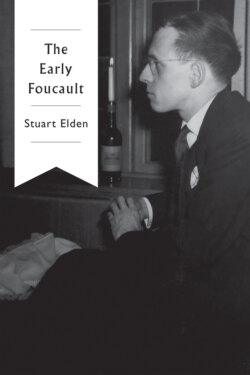Читать книгу The Early Foucault - Stuart Elden - Страница 6
Acknowledgements
ОглавлениеAs a part of a series of books on Foucault, a project which has been intermittent since 2000 and intense since 2013, there is a continuing and overlapping debt to those thanked before.
I particularly thank Mark Kelly for sparking the initial idea; Margaret Atack for sharing David Macey’s correspondence and interview transcripts from his research for The Lives of Michel Foucault; Aner Barzilay for conversations on the early Foucault and sharing transcriptions of student notes; Didier Eribon for allowing me to see Foucault’s letters to Georges Dumézil; Stefanos Geroulanos for sharing other material by Dumézil; Laurent Feneyrou for access to the Foucault–Jean Barraqué correspondence; Paul Griffiths for his notes on that correspondence; and Daniele Lorenzini for conversations about Foucault and the posthumous publication programme. I remain grateful to Daniel Defert and Henri-Paul Fruchaud. At a late stage, Daniele and Alison Downham Moore generously read the entire manuscript and made some useful suggestions.
For the first time I have employed research assistants to help with some foreign language material. Oscar Jängnemyr provided summaries or translations of Swedish texts about Foucault’s time in Uppsala; Julia Jasińska summarized a Polish book; Federico Testa summarized Alessandro de Lima Francisco and Marcio Luiz Miotto’s unpublished Portuguese theses, which they kindly sent to me; and Melissa Pawelski located some archival documents, shared notes, and translated a key text about Foucault’s time in Hamburg.
I gratefully acknowledge the British Academy/Leverhulme small grant SRG1819\191434, supported by the Department for Business, Energy and Industrial Strategy, and the Department of Politics and International Studies and the Humanities Research Centre at the University of Warwick for funding archival visits.
For access to archival material I thank the Archives littéraires suisses, Berne; Archives Nationales, Pierrefitte-sur-Seine; Bibliothèque interuniversitaire Sorbonne; Bibliothèque Lettres Ulm, École Normale Supérieure; Bibliothèque-Musée de l’Opéra; Bibliothèque nationale de France-Richelieu, archives et manuscrits, especially Laurence le Bras; Bibliothèque nationale de France-Richelieu-Louvois, département de musique; Nathalie Queyroux and David Denéchaud at the Centre d’Archives en Philosophie, History et Édition des Sciences (CAPHÉS), École Normale Supérieure; Carolina Rediviva Library, special collections room, Uppsala University; Collège de France; Institut Mémoires de l’édition contemporaine (IMEC), Caen; Staats- und Unibibliothek Hamburg; Staatsarchiv Hamburg; Staatsarchiv Thurgau, Frauenfeld; Universitätsarchiv Tübingen; and Beinecke Rare Book and Manuscript Library, Yale University. Peter Harrington Books in Chelsea allowed me to consult a rare copy of the pre-thesis version of Folie et déraison.
I have used several other libraries to find material for this study: Bibliothèque nationale de France–François Mitterand; Bibliothèque Sainte-Geneviève; Bodleian Library, University of Oxford; British Library Rare Books room and Newsroom; Senate House Library; the Tate Library; the Warburg Institute; Wellcome Library; and the libraries of the University of Amsterdam, Columbia University, London School of Economics, University College London and University of Warwick. Warwick staff were very helpful in getting hard-to-find material through the document supply service.
Several other people encouraged, sourced texts or answered questions, and I am grateful to them all: Valentina Antoniol, Christian Abrahamsson, Edward Baring, Elisabetta Basso, Luiza Bialasiewicz, Ryan Bishop, Giuseppe Blanco, Natalie Bouchard, Kurt Borg, Neil Brenner, Chris Brooke, Sebastian Budgen, Graham Burchell, Douglas Burnham, Oliver Davis, Alfred Denker, Elgin Diaz, Klaus Dodds, ‘Ambulo Ergosum’, Mike Featherstone, Colin Gordon, G. M. Goshgarian, Kélina Gotman, Victor Gourevitch, Anna Gumucio Ramberg, Peter Gratton, Inanna Hamati-Ataya, Bernard Harcourt, Marcelo Hoffman, Richard Howard, Luke Ilott, Orazio Irrera, Scott Johnson, Gerry Kearns, Philipp Kender, Anna Krakus, Léopold Lambert, Scott Lash, Stephen Legg, Kai Frederik Lorentzen, Jeff Malpas, Eduardo Mendieta, José Luis Moreno Pestaña, Adam David Morton, Rainer Nicolaysen, Hidefumi Nishiyama, Clare O’Farrell, Gunnar Olsson, Mate Paksy, William Parkhurst, Paul Patton, ‘Petra’, Lucas Pohl, Sverre Raffnsøe, John Duke Raimo, Simon Reid-Henry, John Russell, Parastou Saberi, Philippe Sabot, Christopher Smith, Bal Sokhi-Bulley, Robert A. Tally, Cristina Vatulescu, Nick Vaughan-Williams, Pierre Vesperini, Jean-Baptiste Vuillerod, David Webb, Richard Wilson, and Andreja Zevnik.
I also thank the readers of my Progressive Geographies blog who followed this project through its development. Some resources produced during this work are available at www.progressivegeographies.com/resources/foucault-resources.
Work in this book was presented to audiences at ACCESS Europe, University of Amsterdam; Complutense University of Madrid; Institute of Historical Research, University of London; University of Sussex; Theory, Culture and Society; and University of Warwick. Planned talks at the University of Bologna, New York University and University of Oxford were unfortunately cancelled due to the COVID-19 pandemic. Late stages of the research were conducted around travel restrictions and partial lockdown, and the manuscript completed in challenging academic circumstances. For support in this, and much else, I thank Susan.
At Polity Press I am grateful to Pascal Porcheron, Ellen Macdonald-Kramer, and John Thompson, and the readers of the original proposal for their enthusiasm for my work. In particular I thank Pascal and two anonymous readers for their comments on the manuscript. Susan Beer copy-edited the text and Lisa Scholey compiled the index.
An earlier version of parts of Chapter 4 appeared as ‘Foucault as Translator of Binswanger and von Weizsäcker’ in Theory, Culture and Society. The material is reused with Sage’s permission.
